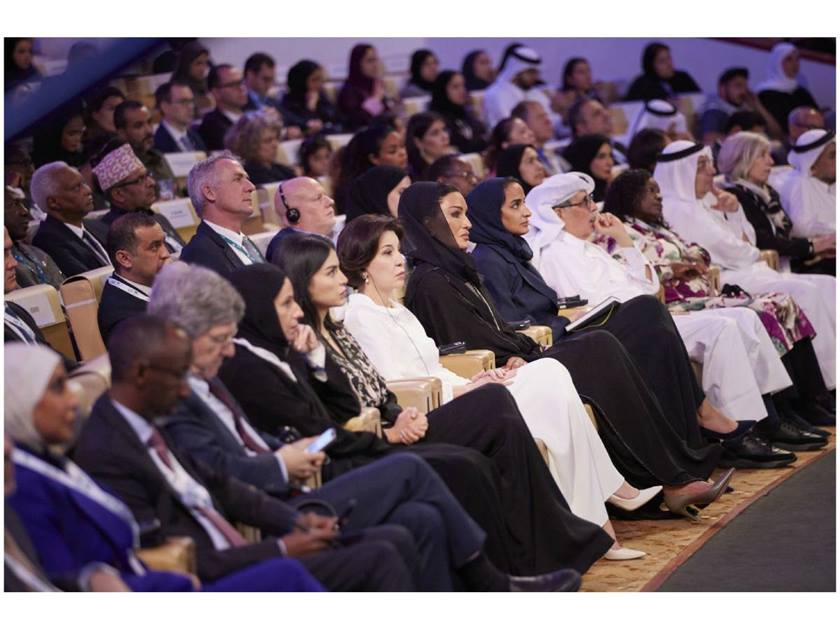HH Sheikha Moza bint Nasser Witnesses Session on Education in Times of War within WISE 2023 Summit Activities

Doha, November 29 (QNA) - HH Sheikha Moza bint Nasser, Chairperson of the Education Above All Foundation, witnessed the plenary session organized by the foundation under the title "Education in Times of War" during the activities of the World Innovation Summit for Education 2023 (WISE).
The session, attended by HE First Lady of Uzbekistan Ziroatkhon Hoshimova, HE Vice Chairperson and CEO of Qatar Foundation for Education, Science and Community Development (QF) Sheikha Hind bint Hamad Al-Thani, and a number of Their Excellencies Ministers and officials, focused on raising global awareness about the Gaza Strip crisis, the importance of educational recovery, dealing with trauma, and psychosocial support.
In this context, University Professor and Director of the Center for Sustainable Development at Columbia University Jeffrey Sachs talked about the significant role of education in sustainable development and the necessity of adhering to it, especially in times of war and crisis, calling for thinking about the turmoil that the world is witnessing today and trying to find a solution to it.
He recalled the history of the establishment of the Security Council, its objectives, and its major role in finding a solution to the world's problems and putting an end to wars and conflicts. He noted that the Council proposed various solutions to the Palestinian issue, the most important of which is the two-state solution, and emphasized this solution in all its relevant resolutions as well as supporting the Arab initiative.
Jeffrey added that the solution to the Palestinian issue is not by launching initiatives or proposing solutions but by the ability to implement decisions on the ground. The Security Council must approve the acceptance of Palestine as a full member of the United Nations and adopt it as an independent state, which is an old demand, however, behind the scenes, the UN is not serious about that.
In a different context, Al Fakhoora Scholarship Graduate Athar Ahmed reviewed her personal experience and the humanitarian crises she had been exposed to since her childhood, beginning with hearing the roar of planes and the sounds of bombing, artillery, bombs, and tanks, and seeing her family members covered in their blood and their body parts scattered, as a result of the bombing of their home in Gaza, and how the Al Fakhoora scholarship had the credit to her transformation and personal development and the catalyst for change and advancement again.
She indicated how education had a transformative power that helped withstand shocks and deal with life's challenges with steadfastness and strength, stressing the importance of protecting education because it is a glimmer of hope for a better future, and advocating the right to education so that future generations do not suffer more and more.
For his part, Founder and CEO of the Center for Mind-Body Medicine James Gordon talked about the center's role in Gaza and how its programs were developed to deal with the traumas suffered by society there, especially children. He pointed out that trauma in Gaza results from seeing blood and body parts, but what exacerbates its difficulty is that the trauma is collective.
He indicated that the shock reaction is either by fighting or fleeing, meaning that a person faces his fears and fights for his survival, or flees the place. The other reaction is by freezing, so the body's systems malfunction and do not respond to the commands of the mind, and this action results from the secretion of certain hormones in the body. He explained that, as doctors in the field, they treat these shocks with medications, psychological and counseling sessions, breathing and relaxation exercises, or exercise in cases of freezing.
Dr. James Gordon pointed out that the center's program in Gaza was able to train more than 1,500 teachers, counselors, and medical workers to enhance children's recovery from trauma, and who in turn were able to treat more than 85,000 children in various areas, including shelters, schools, mosques, and others, and also teach them some exercises that help them recover from trauma and share their experiences with their peers.
In turn, Ameera Harouda, a journalist from Gaza and one of the war survivors, explained how people and children felt safe and reassured in schools that were not spared from the bombing, highlighting the importance of protecting education and giving Palestinian children the opportunity to complete their education and hone their skills, especially since they have sharp intelligence, minds, leaders, and determination, and above all, their great commitment to education.
She stressed the need to protect schools in times of conflict and provide alternatives to classroom education, praising in this context the role of the Education Above All Foundation (EAA) in providing quality education to the children of the world, especially in Gaza, and the grants that increase year after year in the Strip, and the role of these grants in changing the lives of many families.
Palestinian-American standup comedian Mohammed Amer talked, during the session via videoconferencing, about the necessity of raising awareness about Gaza and solidarity with the Palestinian people, highlighting the ongoing challenges facing the Gaza Strip and ensuring that it remains at the highest level of the global agenda. He noted the importance of sharing personal stories and testimonies from the residents of the Gaza Strip and the Palestinian people and providing realistic statistics to clarify the humanitarian crisis that people there are suffering from. (QNA)





